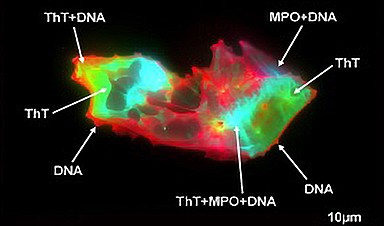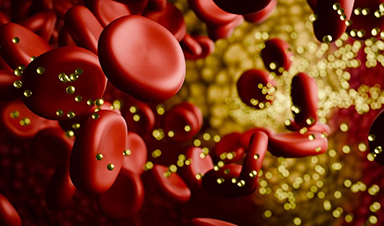| Researchers from Tel Aviv University proved that a drug delivery system based on lipid nanoparticles can utilize RNA to overcome resistance to both chemotherapy and immunotherapy in cancer treatments. The study opens a new path to a personalized and precisely targeted battle against cancer. | |
| The results were published in the scientific journal Advanced Materials (“Dual-Targeted Lipid Nanotherapeutic Boost for Chemo-Immunotherapy of Cancer”). |
| The study was led by TAU Vice President for R&D Prof. Dan Peer, Head of the Laboratory of Precision Nanomedicine at the Shmunis School of Biomedicine and Cancer Research, Wise Faculty of Life Sciences, and a member of the Roman Abramovich Center for Nanoscience and Nanotechnology, together with post-doctoral researcher Dr. Seok-Beom Yong of South Korea. The study was funded via an ERC grant from the European Union and a research scholarship from the Korean government. | |
| Chemo-immunotherapy, which combines chemotherapy with immunotherapy, is considered the most advanced standard of care for various types of cancer. While chemotherapy destroys cancer cells, immunotherapy encourages the cells of the immune system to identify and attack the remaining cancer cells. | |
| However, many patients fail to respond to chemo-immunotherapy, which means that the treatment is not sufficiently targeted. Prof. Peer and his team are the first in the world to prove the feasibility of a drug delivery system based on lipid nanoparticles that release their load only at the specifically targeted cells – cancer cells for chemotherapy and immune cells for immunotherapy. | |
| “In our system a single nanoparticle is capable of operating in two different arenas,” explains Prof. Peer. “It increases the sensitivity of cancer cells resistant to chemotherapy, while also reinvigorating immune cells and increasing their sensitivity to cancer cells. Thus, with one precisely targeted nanoparticle we provide two different treatments, at very different sites. We tested this system in two types of lab models – one for metastasized melanoma, and the other for a local solid tumor. In both populations we observed positive effects of our delivery system.” |
| The new development by Prof. Peer’s team builds from another recent discovery: an enzyme called HO1 is used by cancer cells for both resisting chemotherapy and concealing themselves from the immune system. Silencing HO1 in the tumor is thus considered an optimal strategy in clinical research, but so far, all attempts to silence the enzyme led to severe side effects. | |
| “Chemo-resistant tumors pose a significant challenge in our endless battle against cancer,” says Prof. Peer. “We aim to silence the enzyme HO1 which enables tumors to develop resistance to chemotherapy, and to conceal themselves from the immune system. But existing methods for silencing HO1 resemble using an F-16 fighter jet to blast a tiny ant. Our new nanodrug knows how to precisely target the cancer cells, silence the enzyme, and expose the tumor to chemotherapy, without causing any damage to surrounding healthy cells. Afterwards, the same nanoparticle goes on to the T-cells of the immune system and reprograms them to identify cancer cells. Active, highly aggressive tumors are able to conceal themselves from the immune system, and we restore the immune cells’ ability to recognize the cancer as a foreign body and attack it.” | |
| “This is the first instance of a single drug based on an RNA-loaded nanoparticle doing two very different, even opposite jobs,” adds Prof. Peer. “This is only an initial study, but it has enormous potential in the ongoing fight against cancer.” |
News
Two New Books From Frank Boehm, NA Founder – To be Released Dec. 2025
Molecular Manufacturing: The Future of Nanomedicine This book explores the revolutionary potential of atomically precise manufacturing technologies to transform global healthcare, as well as practically every other sector across society. This forward-thinking volume examines [...]
What could the future of nanoscience look like?
Society has a lot to thank for nanoscience. From improved health monitoring to reducing the size of electronics, scientists’ ability to delve deeper and better understand chemistry at the nanoscale has opened up numerous [...]
Scientists Melt Cancer’s Hidden “Power Hubs” and Stop Tumor Growth
Researchers discovered that in a rare kidney cancer, RNA builds droplet-like hubs that act as growth control centers inside tumor cells. By engineering a molecular switch to dissolve these hubs, they were able to halt cancer [...]
Platelet-inspired nanoparticles could improve treatment of inflammatory diseases
Scientists have developed platelet-inspired nanoparticles that deliver anti-inflammatory drugs directly to brain-computer interface implants, doubling their effectiveness. Scientists have found a way to improve the performance of brain-computer interface (BCI) electrodes by delivering anti-inflammatory drugs directly [...]
After 150 years, a new chapter in cancer therapy is finally beginning
For decades, researchers have been looking for ways to destroy cancer cells in a targeted manner without further weakening the body. But for many patients whose immune system is severely impaired by chemotherapy or radiation, [...]
Older chemical libraries show promise for fighting resistant strains of COVID-19 virus
SARS‑CoV‑2, the virus that causes COVID-19, continues to mutate, with some newer strains becoming less responsive to current antiviral treatments like Paxlovid. Now, University of California San Diego scientists and an international team of [...]
Lower doses of immunotherapy for skin cancer give better results, study suggests
According to a new study, lower doses of approved immunotherapy for malignant melanoma can give better results against tumors, while reducing side effects. This is reported by researchers at Karolinska Institutet in the Journal of the National [...]
Researchers highlight five pathways through which microplastics can harm the brain
Microplastics could be fueling neurodegenerative diseases like Alzheimer's and Parkinson's, with a new study highlighting five ways microplastics can trigger inflammation and damage in the brain. More than 57 million people live with dementia, [...]
Tiny Metal Nanodots Obliterate Cancer Cells While Largely Sparing Healthy Tissue
Scientists have developed tiny metal-oxide particles that push cancer cells past their stress limits while sparing healthy tissue. An international team led by RMIT University has developed tiny particles called nanodots, crafted from a metallic compound, [...]
Gold Nanoclusters Could Supercharge Quantum Computers
Researchers found that gold “super atoms” can behave like the atoms in top-tier quantum systems—only far easier to scale. These tiny clusters can be customized at the molecular level, offering a powerful, tunable foundation [...]
A single shot of HPV vaccine may be enough to fight cervical cancer, study finds
WASHINGTON -- A single HPV vaccination appears just as effective as two doses at preventing the viral infection that causes cervical cancer, researchers reported Wednesday. HPV, or human papillomavirus, is very common and spread [...]
New technique overcomes technological barrier in 3D brain imaging
Scientists at the Swiss Light Source SLS have succeeded in mapping a piece of brain tissue in 3D at unprecedented resolution using X-rays, non-destructively. The breakthrough overcomes a long-standing technological barrier that had limited [...]
Scientists Uncover Hidden Blood Pattern in Long COVID
Researchers found persistent microclot and NET structures in Long COVID blood that may explain long-lasting symptoms. Researchers examining Long COVID have identified a structural connection between circulating microclots and neutrophil extracellular traps (NETs). The [...]
This Cellular Trick Helps Cancer Spread, but Could Also Stop It
Groups of normal cbiells can sense far into their surroundings, helping explain cancer cell migration. Understanding this ability could lead to new ways to limit tumor spread. The tale of the princess and the [...]
New mRNA therapy targets drug-resistant pneumonia
Bacteria that multiply on surfaces are a major headache in health care when they gain a foothold on, for example, implants or in catheters. Researchers at Chalmers University of Technology in Sweden have found [...]
Current Heart Health Guidelines Are Failing To Catch a Deadly Genetic Killer
New research reveals that standard screening misses most people with a common inherited cholesterol disorder. A Mayo Clinic study reports that current genetic screening guidelines overlook most people who have familial hypercholesterolemia, an inherited disorder that [...]





















